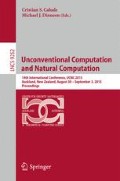Abstract
Consider the holiday season, where there are n players who would like to exchange gifts. That is, we would like to generate a random permutation having no fixed point. It is known that such a random permutation can be obtained in a hidden form by using a number of physical cards of four colors with identical backs, guaranteeing that it has no fixed point (without revealing the permutation itself). This paper deals with such a problem and improves the known result: whereas the known protocol needs \(O(n^2)\) cards of four colors, our efficient protocol uses only \(O(n \log n)\) cards of two colors.
Access this chapter
Tax calculation will be finalised at checkout
Purchases are for personal use only
Notes
- 1.
Throughout this paper, we say that a card has the same “color” as another one if they have the same pattern on their face sides.
- 2.
Note that we cannot use a standard deck of playing cards because each of them has a unique pattern on its face side.
- 3.
All logarithms are base 2 throughout this paper.
References
den Boer, B.: More efficient match-making and satisfiability. In: Quisquater, J.J., Vandewalle, J. (eds.) EUROCRYPT 1989. LNCS, vol. 434, pp. 208–217. Springer, Heidelberg (1990)
Cordón-Franco, A., Van Ditmarsch, H., Fernández-Duque, D., Soler-Toscano, F.: A colouring protocol for the generalized Russian cards problem. Theor. Comput. Sci. 495, 81–95 (2013)
Crépeau, C., Kilian, J.: Discreet solitary games. In: Stinson, D.R. (ed.) CRYPTO 1993. LNCS, vol. 773, pp. 319–330. Springer, Heidelberg (1994)
Duan, Z., Yang, C.: Unconditional secure communication: a Russian cards protocol. J. Comb. Optim. 19(4), 501–530 (2010)
Fischer, M.J., Wright, R.N.: Bounds on secret key exchange using a random deal of cards. J. Cryptology 9(2), 71–99 (1996)
Mizuki, T., Asiedu, I.K., Sone, H.: Voting with a logarithmic number of cards. In: Mauri, G., Dennunzio, A., Manzoni, L., Porreca, A.E. (eds.) UCNC 2013. LNCS, vol. 7956, pp. 162–173. Springer, Heidelberg (2013)
Mizuki, T., Kumamoto, M., Sone, H.: The five-card trick can be done with four cards. In: Wang, X., Sako, K. (eds.) ASIACRYPT 2012. LNCS, vol. 7658, pp. 598–606. Springer, Heidelberg (2012)
Mizuki, T., Sone, H.: Six-card secure AND and four-card secure XOR. In: Deng, X., Hopcroft, J.E., Xue, J. (eds.) FAW 2009. LNCS, vol. 5598, pp. 358–369. Springer, Heidelberg (2009)
Mizuki, T., Uchiike, F., Sone, H.: Securely computing XOR with 10 cards. Australas. J. Comb. 36, 279–293 (2006)
Niemi, V., Renvall, A.: Secure multiparty computations without computers. Theor. Comput. Sci. 191(1–2), 173–183 (1998)
Nishida, T., Hayashi, Y., Mizuki, T., Sone, H.: Card-based protocols for any Boolean function. In: Jain, R., Jain, S., Stephan, F. (eds.) TAMC 2015. LNCS, vol. 9076, pp. 110–121. Springer, Heidelberg (2015)
Nishida, T., Mizuki, T., Sone, H.: Securely computing the three-input majority function with eight cards. In: Dediu, A.-H., Martín-Vide, C., Truthe, B., Vega-Rodríguez, M.A. (eds.) TPNC 2013. LNCS, vol. 8273, pp. 193–204. Springer, Heidelberg (2013)
Stiglic, A.: Computations with a deck of cards. Theor. Comput. Sci. 259(1–2), 671–678 (2001)
Swanson, C.M., Stinson, D.R.: Combinatorial solutions providing improved security for the generalized Russian cards problem. Des. Codes Crypt. 72(2), 345–367 (2014)
Acknowledgments
We thank the anonymous referees whose comments helped us to improve the presentation of the paper. This work was supported by JSPS KAKENHI Grant Number 26330001.
Author information
Authors and Affiliations
Corresponding author
Editor information
Editors and Affiliations
Rights and permissions
Copyright information
© 2015 Springer International Publishing Switzerland
About this paper
Cite this paper
Ishikawa, R., Chida, E., Mizuki, T. (2015). Efficient Card-Based Protocols for Generating a Hidden Random Permutation Without Fixed Points. In: Calude, C., Dinneen, M. (eds) Unconventional Computation and Natural Computation. UCNC 2015. Lecture Notes in Computer Science(), vol 9252. Springer, Cham. https://doi.org/10.1007/978-3-319-21819-9_16
Download citation
DOI: https://doi.org/10.1007/978-3-319-21819-9_16
Published:
Publisher Name: Springer, Cham
Print ISBN: 978-3-319-21818-2
Online ISBN: 978-3-319-21819-9
eBook Packages: Computer ScienceComputer Science (R0)

